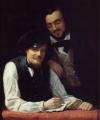| |
|
|
|
Men's portraits 19th century (first half 1800-1850) in art and painting
The characteristic features of male portraits in the painting of the first half of the 19th century may vary depending on the artistic direction and the individual approach of the artists. However, there are certain general trends that can be highlighted: - 1. Romantic aesthetics: At this time, Romanticism was the predominant artistic direction, and portraits reflected the splendor and sensuality of this era. Male portraits often depicted artistic and chivalrous figures or literary heroes.
- 2. Identification of social status: Male portraits often reflected the social and political position of the model. High status was displayed through outfits and accessories, such as military uniforms, uniforms of members of the aristocracy or ornate costumes.
- 3. The ideal of masculinity: Men in portraits were often depicted with strong features, a masculine expression and an emphatic manner. Confidence, strength and energy were the key features that the artists sought to convey.
- 4. Modesty and seriousness: Despite the appeal to the aesthetics of romanticism, male portraits were often distinguished by modesty and seriousness. The artists sought to convey the inner world and individuality of the model, and not just her appearance.
- 5. Lack of emotional expression: In general, male portraits of the 19th century were characterized by a relative restraint of emotions. The artists sought to convey the intellectual and inner essence of the model, as well as its society and status.
These are just some common features of male portraits of the first half of the 19th century. Of course, each artist had his own unique style and approach to depicting men, so variations in style and subject matter were common.
Hundreds of masterpieces ( portraits of men's of 19th century in art and painting) with comments and detailed descriptions.
|
|
Pictures:
Henri Lacordaire at Sorreze :: Anne-Francois-Louis Janmot
 |
Bildnisse Henry Francis Makins Und Mrs Maskenkostum :: Anton Romako
 |
Henry Irving as Hamlet :: Edwin Longsden Long
 |
Study of an Arab :: Charles Bargue
 |
Study of an Arab :: Charles Bargue
 |
King Wilhelm I :: Joseph Karl Stieler
 |
A Day In the Country :: Louis Eugene Coedes
 |
Portrait of the reverend Harry Jones :: George Frederick Watts
 |
Portrait of William Pink :: William Holman Hunt
 |
Hubert Robert, Artist :: Elisabeth Louise Vigee-Le Brun
 |
Arthur Wellesley, 1st Duke of Wellington with Sir Robert Peel :: Franz Xavier Winterhalter
 |
Charles-Jerome, Comte Pozzo di Borgo :: Franz Xavier Winterhalter
 |
King Louis Philippe :: Franz Xavier Winterhalter
 |
Leopold I, King of the Belgians :: Franz Xavier Winterhalter
 |
Louis Charles Philippe Raphael D'Orleans, Duc de Nemours :: Franz Xavier Winterhalter
 |
Napoleon Alexandre Louis Joseph Berthier, Prince de Wagram and his Daughter, Malcy Louise Caroline Frederique :: Franz Xavier Wi
 |
Portrait of a Young Architect :: Franz Xavier Winterhalter
 |
Prince Albert :: Franz Xavier Winterhalter
 |
Self Portrait of the Artist with his Brother, Hermann :: Franz Xavier Winterhalter
 |
Portrait Of Lieutenant Colonel, Comte De Thalouet :: Horace Vernet
 |
The Reverend John Brodhead Romeyn :: Samuel Lovett Waldo
 |
Hide Comments (3)
|
|
|
Home-artlib >
|
|
|
|
|
|
|
|
|
In the portraits of the early 19th century there are realistic images of the military and men of other professions. They are portrayed without exaggeration, as they are in the daily situation. Also almost sketch works appear, as "Study of an Arab" Charles Bargue, in which the face of the hero is almost invisible, the artists allow themselves to depart from the traditional canons. And the background for the portrait is now not only the interior, but the nature too.
1
I am delighted with this magnificent man! Perfect posture, proud look, and how his uniform shines!
2
Tags: portrait of a man, beard, mustache, wavy hair, light background, sword, white gloves, ribbons, dress suit, red pants, cross, order, high hat, dark eyes, gold uniform, white feather
3